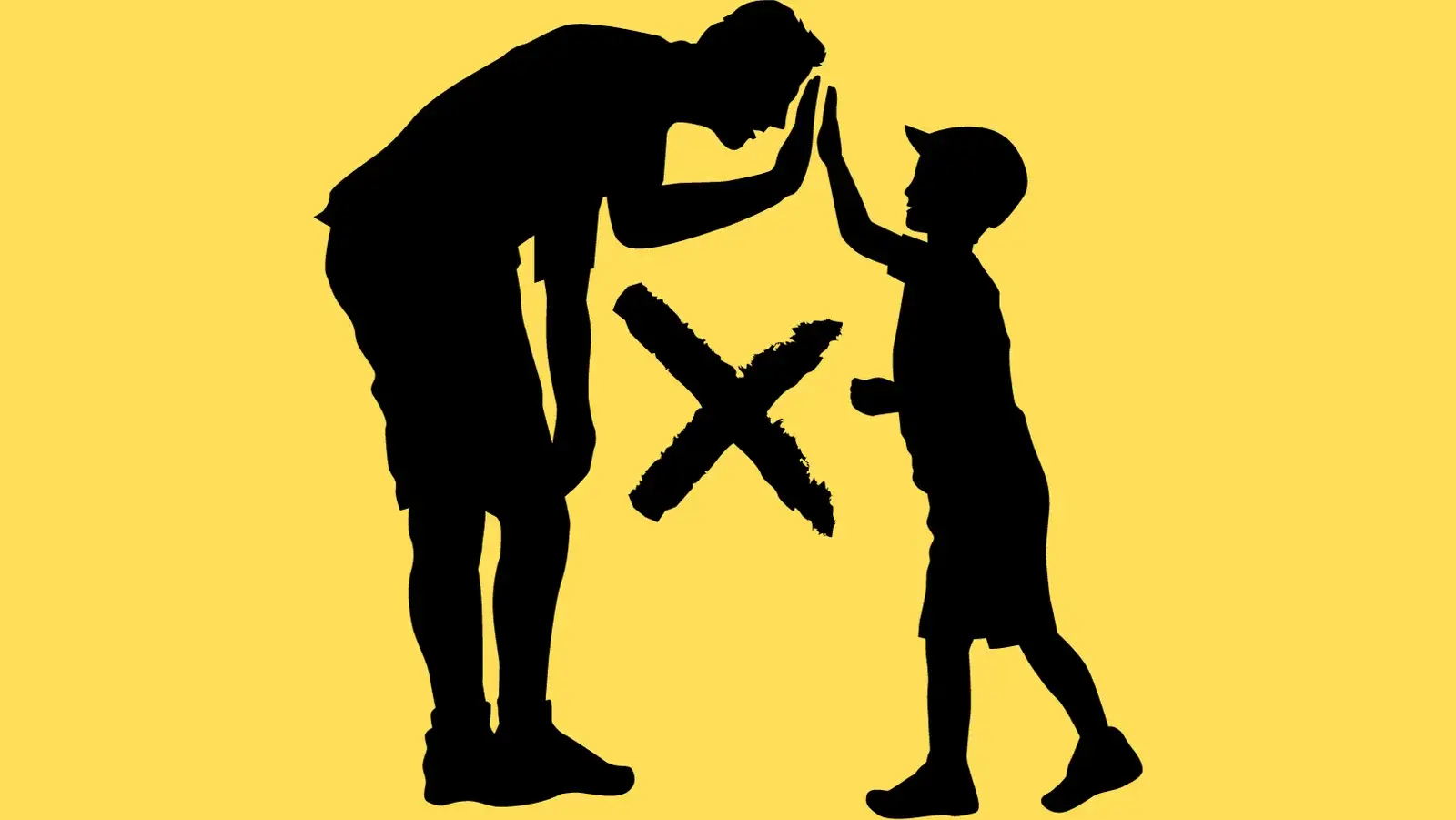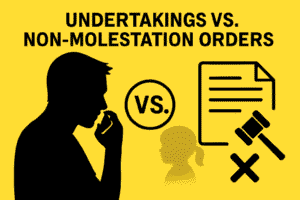When a non-molestation order is made, it’s often a moment of panic. Especially for dads. The fear of losing contact with your children – or feeling like you’ve been labelled a risk before you’ve even had a chance to respond – hits hard. And if you’re also trying to maintain child contact during this time, the process can feel impossible to navigate.
This guide is here to steady the ship.
We’ll break down what a non-molestation order (NMO) actually means for your parental rights, what steps to take, and how you can still secure contact with your children – even when communication with your ex is restricted.
🔑 Key Takeaways
- A non-molestation order (NMO) protects against harassment, intimidation, or threats – but it can indirectly affect child contact.
- You can still see your child, but it usually requires a Child Arrangements Order through court.
- Never breach the order – even by mistake. Breaches are a criminal offence.
- If your ex is using an NMO to block contact, your next step is a C100 application backed by a Position Statement.
- Courts often allow safe contact arrangements (supervised, indirect, or direct) if it’s in the child’s best interests.
Jump to:
- What Is a Non-Molestation Order – And Why Does It Affect Child Contact?
- Can You Still See Your Child If a Non-Molestation Order Is in Place?
- What If Your Ex Is Using the NMO to Block Contact?
- Step-by-Step: How to Regain Contact as a Dad
- Tips for Dads Facing Both an NMO and Child Contact Dispute
- FAQs
- Conclusion
What Is a Non-Molestation Order – And Why Does It Affect Child Contact?
A non-molestation order is a protective court order that prevents one person from harassing, intimidating, or threatening another. It’s a civil order, often used during family breakdowns, and can be made even without evidence of a criminal offence.
While it’s designed for protection, it can indirectly impact your contact with your children – especially if you’re not allowed to contact the other parent.
In most cases:
- You’ll be prevented from visiting the family home
- You may be banned from contacting the other parent directly
- Any breach could become a criminal offence
That means arranging handovers, discussing childcare, or even asking to see your child could technically violate the order – putting you at serious legal risk.
That’s why informal agreements don’t work here. You need the court to step in – and to keep your side clean while they do.
Can You Still See Your Child If a Non-Molestation Order Is in Place?
Yes, you can still apply for child contact – but you’ll need to do it through the courts, not informal arrangements.
Even when things feel unfair or tactical, your best move is still a legal one.
Here’s what often happens:
- If your ex applies for both a Non-Molestation Order and a Child Arrangements Order (CAO), the court may consider contact options like supervised visits or indirect contact.
- If there’s no CAO in place and only an NMO, you’ll need to apply for a Child Arrangements Order yourself to re-establish contact through official channels.
Even with serious allegations in play, courts do want children to have a relationship with both parents – as long as it’s safe and appropriate.
What If Your Ex Is Using the NMO to Block Contact?
This is common – and understandably frustrating.
Sometimes, an NMO is used as a legal tactic in child arrangement disputes. If there’s no CAO in place, and you’re barred from contacting your ex, it can effectively block you from seeing your child altogether.
What can you do?
- ✅ Apply for a Child Arrangements Order – this puts the contact issue in front of a judge.
- ✅ Prepare a strong Position Statement – outlining your intentions, parenting history, and why contact is in your child’s best interests.
- ✅ Stay calm, respectful, and child-focused – this will work in your favour in court, especially during CAFCASS assessments.
Step-by-Step: How to Regain Contact as a Dad
Even with a non-molestation order in place, here’s how to begin rebuilding your parenting time:
1. Understand the Restrictions
Make sure you know exactly what the NMO says. Breaching it, even by mistake, is a criminal offence. If you’re unsure – get clarity.
2. Book a MIAM (if safe)
You’ll usually need to attend a Mediation Information and Assessment Meeting before applying to court – unless you’re exempt due to domestic abuse concerns or urgency (like an NMO already in place).
💡 Need help arranging this? Check our MIAM support service
3. Apply for a Child Arrangements Order
This formally asks the court to assess and order child contact – either direct, indirect, or supervised. If you’re blocked from communication, this is your route back in.
4. Prepare for the CAFCASS Process
You’ll likely be assessed by CAFCASS (the Children and Family Court Advisory and Support Service). What you say – and how you say it – matters.
✅ We offer full CAFCASS safeguarding call prep – including notes and strategy.
5. Draft Your Statements Carefully
Whether it’s a Position Statement or Witness Statement, your wording will shape how the court sees you. It’s not just what you say – it’s how strategically you say it.
The pressure’s real – but you don’t have to face it in panic mode. These practical steps help protect your position and keep things moving forward.
Tips for Dads Facing Both an NMO and Child Contact Dispute
When you’re dealing with both a non-molestation order and blocked child contact, the pressure is enormous. One wrong move can hurt your case – but the right preparation can move things forward. Here are four key principles that can protect your position and keep the court focused on what matters most: your child.
- Don’t retaliate. Avoid breaching the order, even if you feel provoked.
- Keep everything child-focused. The court cares most about the child’s wellbeing – not point-scoring between parents.
- Use your support options. McKenzie Friend support, strategic guidance, and statement writing can give you the edge.
- Track everything. Keep a log of your parenting efforts, any indirect contact, and your court progress.
For urgent cases, our McKenzie Friend Service offers full start-to-finish support at a fixed fee.
Frequently Asked Questions
When you’re dealing with a non-molestation order – especially one that affects child contact – it’s normal to have a thousand questions. The rules can feel unclear, the stakes are high, and bad advice is everywhere online.
Below, we’ve answered the most common questions dads ask us about NMOs, child contact, and what the court actually looks for. These aren’t just generic answers – they’re based on real-world cases and our experience working inside the family court system.
Can a non-molestation order stop child contact?
Not automatically. A non-molestation order (NMO) is about protecting the other parent, not blocking your child relationship – but it can make informal contact impossible. You’ll likely need to apply for a Child Arrangements Order to get formal contact restored.
What evidence is needed for a non-molestation order?
The threshold is lower than criminal proceedings. A judge can grant an NMO based on the applicant’s written statement alone if they believe there’s risk of harm, intimidation, or harassment. You don’t have to be charged with any offence for it to be granted.
Can I contact my ex if I have a non-molestation order?
Usually not. Most NMOs explicitly ban direct communication. If you need to discuss your child, use a solicitor, mediator, or court process to avoid breaching the order – even accidentally.
Can I see my kids if I have a non-molestation order?
Yes – but it depends on whether a court has granted you formal contact through a CAO. If not, you’ll need to apply. The court may allow contact even if a NMO is in place, often through indirect or supervised means.
What is a reasonable excuse for breaching a non-molestation order?
There are very few. If child contact is court-ordered and the NMO doesn’t explicitly prevent handovers, you might have a defence – but this is legally risky. Always seek clarification or support before doing anything.
👉 Need help responding to a Non-Mol Order? We offer fast, fixed-fee defence support.
Conclusion: You’re Not Out of Options
Being served with a non-molestation order doesn’t mean losing your child. But it does mean moving carefully and strategically.
If you’ve just discovered the order and don’t know where to turn, Dads’ Consultancy is built to support you from day one. We help fathers understand their rights, prepare their response, and stay focused on the outcome that matters most – time with your child.
You’re not powerless. And you’re not alone. With the right guidance, you can move from fear to clarity – and give your child the secure, stable relationship they deserve.
And that’s exactly what we help dads do.
🧐 Insider Insight: Lach, our founder, is a qualified social worker who used to write Section 7 reports for CAFCASS – the very reports that influence court outcomes. Now he helps dads respond to them. Learn more about Lach’s background.
👉 Learn more about how we can support you or book a free consultation today




